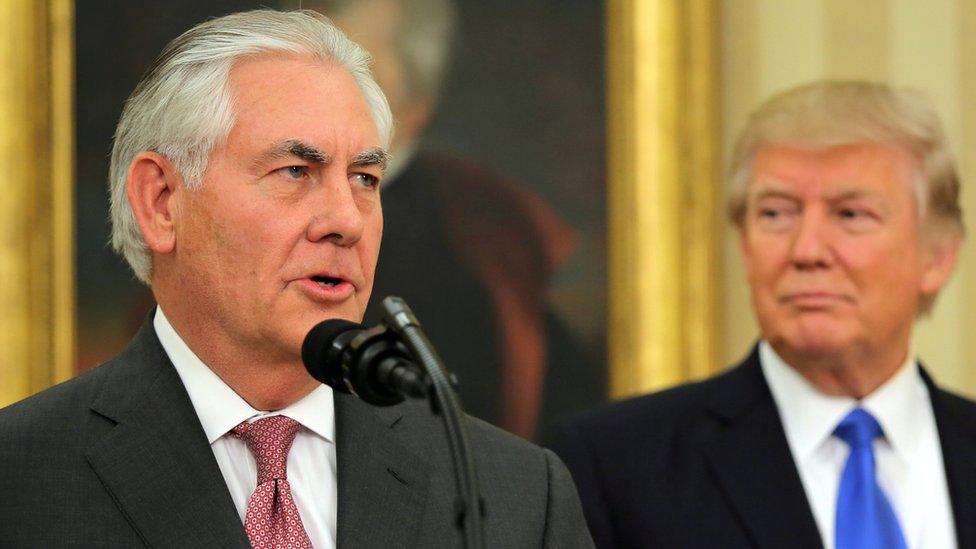Trump's nuclear problem with Iran requires a plan B
- Published

The Trump administration must come up with a clear approach to the problem posed by Iran
Once again rhetoric and reality in the Trump administration appear to be at odds with each other.
Earlier this week, the administration certified to Congress - as it must every 90 days - that Iran was abiding by the terms of the Joint Comprehensive Plan of Action (JCPOA), the formal name given to the 2015 nuclear deal with Iran.
But the US Secretary of State, Rex Tillerson, later underlined that his country's policy towards Iran was under full-scale review.
And in a message that will be heard loud and clear in Tehran, he castigated Iran's "alarming and ongoing provocations" and described the country as "the world's leading state sponsor of terrorism".
There was a broader warning, too. "An unchecked Iran," he said, "has the potential to travel the same path as North Korea".
So is the Trump administration behaving inconsistently? Well, probably not.
Certifying that Iran is upholding its end of the bargain does not preclude a fundamental US policy review - one that would be normal for any incoming administration, and, given the personnel surrounding US President Donald Trump, is likely to be far from sympathetic to Tehran.
The Iran deal of course was famously characterised by then candidate Mr Trump as one of the worst deals ever negotiated. For now it is still there and for all we know it may have considerable life in it yet.
The problem for US policy is to grapple with three aspects of Iran and its behaviour.
Firstly, there is the nuclear issue, and whatever the controversy surrounding the nuclear deal, it does impose constraints on Tehran's nuclear programme in return for tangible economic benefits. Iran at the moment is not "unchecked", to use the term mentioned by Mr Tillerson.
Many western experts back the deal even if they have little enthusiasm for it. Even senior security figures in Israel - who opposed the Obama administration's negotiation of the agreement - have tacitly accepted that it does provide a framework to manage the problem.
Reports suggest that even the Saudis - also long-time opponents of the agreement - have counselled Mr Trump not to abandon it. Of course it will not last for ever. And one of the strongest arguments of the deal's critics has always been: What will happen 15 years after the implementation of the deal, when some of the key provisions restricting Iran's nuclear activities expire?
One hope was that it would provide a platform for improved relations between Washington and Tehran. Well that has not proved to be the case. Tensions are rising in the Gulf; the wider chaos in the region which finds Washington and Tehran almost always on different sides has seen to that.
Rex Tillerson: 'Iran's nuclear ambitions are a grave risk to international security'
Indeed Mr Tillerson's tough rhetoric may inevitably influence the ongoing presidential election campaign in Iran - and not in a positive way, at least as far as western interests are concerned. The hope that by the end of the JCPOA's term, Washington will be dealing with a different Tehran, seems as fanciful as ever.
Regional player
Beyond the nuclear issue and bilateral relations there is the thorniest problem of all, Iran's regional role.
Iran is now a crucial player, from Syria to Lebanon; to Yemen and the wider Gulf. It is an active player in the wider struggle against Israel, and Mr Tillerson made a point of mentioning how Tehran was providing support to Hezbollah in Lebanon and to some Palestinian factions in the Gaza Strip.
Even in Iraq, Tehran is a problem for Washington where both back the elected government, but where Tehran and its militias and advisers on the ground are seen as encouraging (or at the very least not discouraging) Shia sectarianism in Iraqi politics.
The supreme irony of course is that it was US actions - the removal of Saddam Hussein's regime in Iraq - that helped propel Iran to this position of regional influence.
Dangerous policy
Given the concerns of Washington's Gulf allies there is a clear danger that Mr Trump's initial policy thoughts may be, for example, to step-up military support for the Saudi-led campaign in Yemen.
Negotiating with Tehran seems to be as far away from the administration's thinking as talking to Pyongyang.
That is not to say that there is not plenty that Washington may legitimately oppose in Iran's actions. But Iran lives in the region. It has its own security concerns and issues. It has often felt marginalised and its views ignored.
Moderating Iranian behaviour is surely a reasonable goal for Mr Trump's policy review, as may be ensuring a measure of deterrence as well.
But it is hard to see how overturning the nuclear deal will improve matters in any way. This was not a bilateral agreement between the US and Iran but an international deal involving Russia and key EU countries.
Indeed EU trade with Iran is growing significantly and the EU's foreign policy chief, Federica Mogherini, recently underscored the EU's view that the deal is working.
If the US seeks to overturn it there could be serious strains in its relationship with some of its key allies. More significantly it would be very hard to restore the range and depth of sanctions that existed before - sanctions one might add that complicated Iran's life but did little to halt its nuclear programme.
The problem for Team Trump is to come up with a viable plan B; one that yields a comprehensive approach to the Iran problem in all its complexity.
The heady days of the US presidential campaign are over. Foreign policy is complicated - very complicated. Interests, allies and principles have to be weighed and balanced against each other. The Trump policy review must contend with this reality.